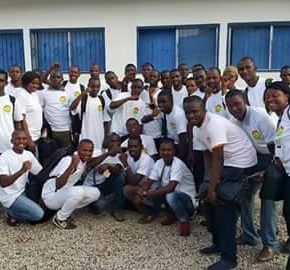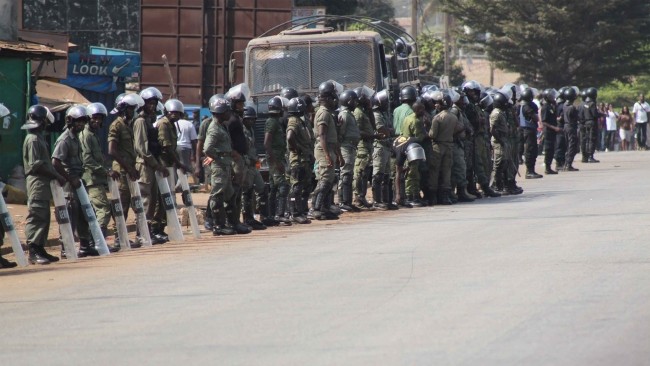
Participants attending the second #blogcamp224. Source: nonloin.mondoblog.org.
Note: All links lead to French-language pages
Well aware of the catastrophic situation in Guinea and the crucial role the Internet plays in the development of a nation, young Guineans have now decided to rise to the challenge, by getting together to blog online and spread this culture of blogging throughout their country.
They have started by providing greater exposure of their blogging activities as well as training up other potential bloggers. The group of bloggers organised their second #blogcamp day on May 23, 2015 after the first ‘Blogging Initiation Day’ took place in February 2011. This first blog camp aimed to promote citizen journalism in Guinea and it had as its slogan “Bloguons Ensemble [1]” (“Let’s blog together”). Unfortunately, this first attempt did not give the bloggers the results they had hoped for. In fact, not one of the blogs created during the first blogging day has survived till now.
Fode Sanikayi Kouyaté, who was at the heart of this initiative (and who had invited me to participate in relaunching these projects) came to his own conclusions. Just before the second #blogcamp took place, the Association of Guinean Bloggers “ablogui” (“blogged”), was formed. The association's birth was followed by the creation of a committee comprised of members living both in and outside the country. Last weekend, the democratic elections for this blogging committee were held online.
In a blog post written soon after the election process, Fode Sanikayi Kouyaté, who was elected as President [2], describes the process:
Il serait hypocrite de prétendre défendre des valeurs que l’on ne peut intégrer dans son comportement. C’est pourquoi, au préalable, ablogui [3] qui compte à jour plus de 75 blogueurs a clairement défini les règles et la procédure d’élection de son bureau composé de sept (7) membres. Il sont élus pour un mandat de trois (3) ans renouvelable une seule fois…
Tout a commencé par la mise en place d’une commission électorale qui a été présidée par Abdoulaye Bah le doyen du blogging en Guinée. Les deux autres membres étaient les blogueurs Gata Doré et Aminata Bérété. En 24h, cette commission a reçu les candidatures et a publié la liste des candidats aux différents postes. Ensuite, une campagne de 72h a été ouverte. Les candidats ont utilisé les canaux de communication internes pour présenter et défendre leur projet pour le réseau. L’étape finale qui est le vote a duré 48h pour permettre à tous les abloguinéens se trouvant partout à travers le monde, d’exercer leur droit. L’élection s’est faite en ligne avec un système de vote très sécurisé et totalement anonyme. Le système a été programmé pour être verrouillé le 15 juin à 18h00 GMT. Automatiquement, les résultats étaient déjà disponibles après quelques secondes. Comme pour dire que le bureau de vote a été fermé à 18h00 et les résultats ont été publiés à 18h00 [4] grâce à l’outil Balotilo [5].
It would be hypocritical to try to defend values that one cannot incorporate into one’s own behaviour. This is why “ablogui,” which currently has more than 75 bloggers, clearly defined the rules and the election process of its seven-member committee beforehand. Committee members were elected for a period of three years and allowed to run again only once thereafter…
The election process began with the establishment of an electoral commission, chaired by Abdoulaye Bah, the doyen of blogging in Guinea. The two other members were bloggers Gata Doré and Aminata Bérété. Within 24 hours, the commission had received applications from the candidates and published the list of individuals running for the different positions. Then came the launch of the 72-hour campaign. The candidates used their various internal communication channels to present and defend their proposals for the online network. The final stage of the process was the voting period which lasted 48 hours. This was in order to allow all of the “ablogui” followers scattered across the globe to exercise their right to vote. The elections took place online anonymously through a very secure voting system. The system was programmed to switch off at precisely 6pm GMT on June 15. The results were automatically available just a few seconds later. Indeed, it was the tool Balotilo [5] that made it possible to close the voting system and publish [4] the results simultaneously.
The candidates put everything they had into their electoral campaigns, whether it was individually or with the aid of a campaign director.
Here is the list of the members selected to committee positions:
- President: Kouyah Kouyaté [6]
- Secretary general: Alimou Sow [7]
- Communication Committee: Melle Dieretou Dina Shiplo Diallo [8]
- Committee member in charge of communication in local languages: Tafsir Baldé [9]
- Committee member in charge of organisation and training : Kindy Dramé [10]
- Treasurer: Mohamed Bangoura
- Technical Committee member: Sally Bilaly Sow [11]
To see what each member publishes, click on their name.
These bloggers hope to play a positive role in keeping Internet users well-informed of anything that could be relevant to the upcoming elections. The bloggers will be closely monitoring the behaviour of the presidential candidates with the aim of informing the online community of any slip ups which could harm the fragile social and political cohesion in the run up to the elections scheduled for October 2015. That's if the incumbent president and the opposition leader manage to come to an agreement.

The penetration rate of the Internet and mobile phone in the continent of Africa. Source: demain.infhotep.com
One should not solely attribute the step back by the “Haute Autorité pour la Communication” (HAC, National Agency for Communication) to the bloggers’ actions. The clumsy decision taken by Martine Condé, President of the HAC organisation, to regulate media activities during the pre-election period has sparked huge concern within the Guinean online community. The surge of online reactions forced the HAC to correct the restrictive measures they had initially put in place.
The reactions of “ablogui” members were just as strong on Facebook. Here are a few extracts:
Sally Bilaly Sow [12] En lisant le texte de la HAC ( Haute Autorité de la Communication) je pensais être vraiment en Corée du Nord. Où tout est à refaire. Du n'importe quoi.
“ Sally Bilaly Sow [12] Just reading the HAC’s text I really thought for a moment I was in North Korea, where everything needs to be taken back to square one. What a load of rubbish.
Thierno Diallo [13] Qu'ils préparent leurs prisons aussi. Parce qu'avec ou sans leur accord la liberté d'expression demeurera en Guinée. A eux de voir.
Thierno Diallo [13] They must be preparing their prisons too. Because whether we have their agreement or not, freedom of expression isn't going anywhere in Guinea. It's up to them to see that.
Bafodé Bangoura [14] Martine Condé sait très bien qu'elle a été illégalement installée à son poste; elle et sa Hac pensent que notre bouche la c'est elles qui l'ont creusées, elles se trompent. Elle n'est pas venue a son temps c'est pourquoi sans quoi elle n'allait pas se permettre de tenter ces genres de “chose” dans ce monde moderne où même les SOURD-MUETS n'ont plus d'obstacle pour s'exprimer facilement et librement.
Bafodé Bangoura [14] Martine Condé knows very well that she was unduly elected to her position; she and her agency think that they are the ones who help us express ourselves, they are wrong. She is a bit late to the party and that is why she cannot try these sorts of things in these times when even the DEAF AND MUTE no longer have anything stopping them from expressing themselves freely.
Mamata Sanguiana Camara [15] C'est du n'importe quoi. On ne peut vivre dans un Etat qui se dit démocratique et que notre liberté d'expression soit limitée. Nous sommes quand même le médium idéal entre gouvernants et gouvernés, la voix des sans voix. La HAC est sensée faire valoir les droits des journalistes et non les limiter. Suis d'avis qu'on insulte pas le président mais le critiquer ça sera impossible. Ce sont les critiques et observation du 4ème pouvoir que nous sommes qui les feront changer. La HAC est là pour imposer ce que l'Etat souhaite ou pour proner la liberté d'expression et le droit à l information? Les professionnelles savent comment sensurer leur produit pour éviter le pire en Guinée car un homme de médias peut détruir un pays vous le savez mieux que moi. Bref on.insultera pas le président mais les critiques et dénonciations avec preuves à l'appui veront toujours le jour.
Mamata Sanguiana Camara [15] It’s a load of rubbish. We can’t live in a state that calls itself democratic and then have our freedom of expression limited. Although we are the ideal medium between those that rule and those that are ruled, the voice of the voiceless. The HAC is supposed to value the rights of journalists, not limit them. In my opinion no one should be allowed to insult the president, but criticising him will be impossible under the current ruling. It is the people's criticisms and observations that will make them change. Is the HAC there to impose what the State wishes or is it meant to advocate freedom of expression and the right to information? Professionals know how to censure their products to avoid the worst for Guinea because the media is capable of destroying a country; you know it better than me. Anyway, we shouldn't insult the president but criticism and denunciations with solid proof will see the light of day.
The bloggers have been among the first to denounce the HAC's press report. The agency had to retract the press release it initially sent out. As reported by radio kankan [17], the corrected press release recognised the lack of tact in the initial report:
au point 2 de l’article 3, il est notamment libellé : “ S’abstenir de l’usage des genres d’opinions tels : l’éditorial, le commentaire, la chronique, le billet’’ Pour l’incompréhension suscitée par cet article, la HAC présente ses excuses aux médias, aux citoyens et à tous les usagers de la presse et les invite à lire cet article nouveau ainsi libellé : ‘’Faire preuve de professionnalisme et de responsabilité dans l’usage des genres d’opinions tels : l’éditorial, le commentaire, la chronique, le billet en tenant compte de la situation socio politique qui prévaut dans le pays
In Article 3 item 2, it is notably worded: “To refrain from expressing viewpoints in the form of: editorial writing, comments, gossip columns, newspaper columns” Due to the confusion caused by this article, the HAC presents its excuses to the media, citizens and all users of the press. The organisation invites them to read this latest Article as follows: “To display professionalism and responsibility when expressing viewpoints in the form of: Editorial writing, comments, gossip columns, newspaper columns by taking into account the sociopolitical situation that prevails in the country.
In a country that has no weekly newspapers, Guinean bloggers play a key role in informing the online community and contributing to the development of public opinion. The hope is that no one takes advantage of such an opportunity to spread malevolent sentiment. In order for the Association of Guinean Bloggers to be respected, it is fundamental that it holds onto its independence in the face of politicians and maintains a solid credibility.
